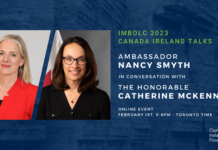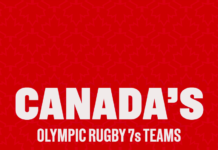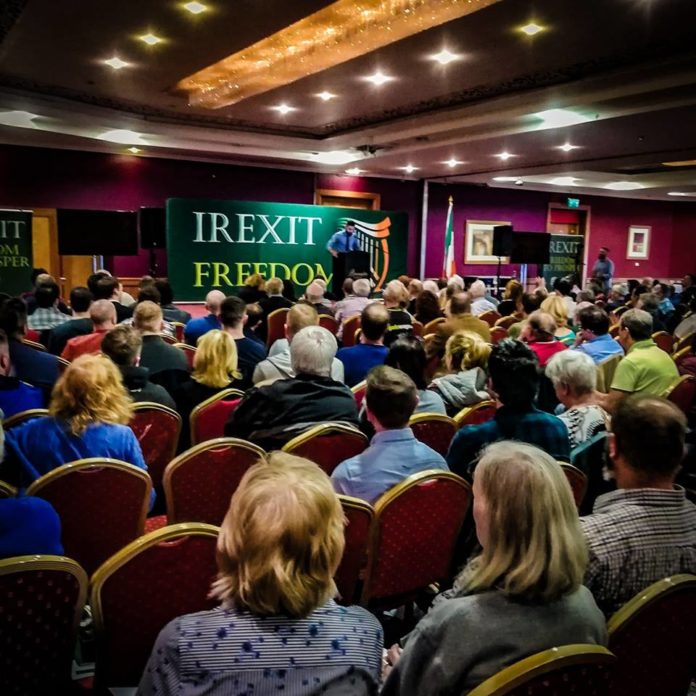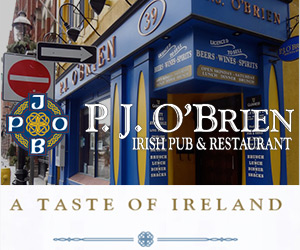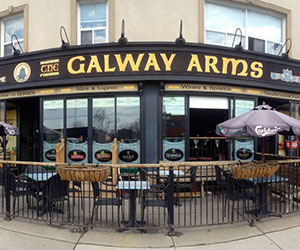For Ray Bassett, Ireland’s former ambassador to Canada, the answer is yes.
During an email exchange with Celtic Canada magazine from his Dublin home this past October, after attending a conference in Belfast, the diplomat, who helped negotiate the historic Good Friday Agreement (GFA) of 1998, wrote that “I honestly believed the Irish government policy on Brexit was not in Ireland’s national interest.”
Bassett has not just gone public with his belief – he attended, and spoke, at the launch of Ireland’s newest political party, Irexit Freedom to Prosper, on Sept. 8, at the Bennington Hotel in Dublin.
“I have enjoyed being able to speak publicly and say what I believe rather than what I am paid to say,” he wrote, of standing up and speaking his mind at a partisan event, something apolitical diplomats seldom do. “I don’t say it to be controversial, but because I sincerely believe it is the right thing to do.”
However, his speaking out has not come without a personal cost to him.
“I find the reaction of some of my former colleagues very disappointing and they have taken my disagreement on policy personally…Naturally, my speaking out caused resentment from the government, but it was a small price to pay,” he wrote, though it would have been much more “comfortable and popular for me to row in with (the) consensus,” he wrote.
The ties that bind
So, why the touchiness in some quarters of Irish public life, when it comes to criticism of the European Union, which Ireland joined on the same day as Britain, New Years’ Day 1973?
“In Ireland, we have a tradition of being very protective of our sacred cows and not very good at accepting constructive criticism of those institutions,” Bassett wrote.
He pointed to the long-held position of the Roman Catholic Church as central to Irish identity and life as an example of an institution with “too much uncritical support. The EU is one of the few institutions where it is regarded as almost traitorous to challenge. That is very unhealthy.”
Negotiating with the British directly is the best way, he feels, “to solve the issue of the border,” since Ireland has deeper connections to Britain than any other EU country. For example, there are more than 500,000 Irish-born people living in Britain. Tthe next highest number? The 17,000 Irish people living in Spain.
“Our connection with the Anglophone world, in terms of culture and ethnic links, are much stronger than with any country on the European mainland,” he wrote.
Bassett clearly bristles that it is a French diplomat, Michel Barnier, who is negotiating on Ireland’s behalf with Britain.
“We should be at the negotiations ourselves,” he wrote, and that allowing Brussels to negotiate with London was “not in conformity with the GFA.”
He also suspects that Brussels may not be negotiating in the best of faith, regarding Brexit as “a threat, and they were determined to make things difficult for Britain.” But for Dublin, their interests were best served when “the better the deal for Britain, and the smoother the Brexit, the better for us.”
Economic ties
As a diplomat, subtlety, context, and complexity are part of the job, so he does acknowledge that EU membership “has been very good for Ireland,” but he added that it is not the advantage it once was.
“The loss of the United Kingdom (from the EU) makes our membership much less attractive,” wrote Bassett. “The UK is still our most important (economic) partner, taking almost half of all goods and services.” He also touched on a familiar sore spot amongst EU critics – the ceding of “even more of our sovereignty,” in areas like defence, foreign policy, and corporate tax, to name a few.
“In fact, almost all new policies coming from Brussels seem to (be) going in a direction which is against our interests,” wrote Bassett.
One thing that still makes the EU attractive is access to the common market (the bloc was originally the EEC, European Economic Community, after all.)
He pointed to European countries outside of the EU, like Switzerland, Iceland, and Norway, “have virtually full access to the single market without being an EU member. Canada enjoys tariff free entry to the single market for 98 per cent of its exports of goods. We should be looking at alternatives.”
Whereas Ireland used to receive farming and road subsidies from the EU, “Ireland is now a rich country and does not rely on any subsidy from the EU. It is a major net contributor to the EU budget.”
And when it comes to the border, he is blunt that “leaving the EU may be the only way, in the end, of preventing a hard border in Ireland, given the EU rigidity in the Brexit negotiations.”
In terms of hard numbers, he stated that, in 2018, Ireland will pay 2.7 billion euros to Brussels, and will receive 1.7 billion euros back, “meaning the Irish taxpayer will subsidize the EU to the tune of around one billion euros. On a per capita basis, it is the same as the UK. However, the EU is looking for Ireland to increase its contribution next year to over three billion euros.” About two thirds of the money Ireland gets from Brussels is through agricultural subsidies – and “there are plans to severely cut back on that (Common Agricultural Policy) which means that Ireland’s net contribution could double over the next few years. In the past, Ireland did benefit from EU funding, but those days are now long gone.”
Border, hard, soft, or none
On the issue of the border, he believes that a technological solution is possible, “if we accept the British proposal that agriculture and small business be exempt from border restrictions. These constitute 80 per cent of all cross-border transactions.” Meanwhile, larger firms, “could operate a system based on technology.” He wrote that he has received “strong endorsement from former custom officials,” on his ideas. “In reality, it is political obstacles which are preventing a solution, not technical ones.”
One solution being proposed during Brexit negotiations is that a border, of sorts, float, if you will, in the Irish Sea, allowing Northern Ireland – which voted, along with Scotland, to stay in the EU in the June 2016 referendum, while England and Wales voted to leave – to stay within the EU customs union, thereby making a hard border unnecessary.
However, this has caught the ire of Ulster unionists, who want no border between the six counties and the rest of Britain. They have an unlikely ally in Dublin, though for different reasons.
“I strongly oppose a border in the Irish Sea,” wrote Bassett. “Just as I strongly oppose a land border on the island of Ireland. In the GFA, the town governments accepted that people in the North could be Irish, British, or both. We promised to accept whatever choice an individual person made. Cutting off nationalists from the rest of Ireland would violate the spirit of the agreement,” which he helped negotiate, and which was approved by voters both North and South in separate votes in 1998. “Equally, cutting off unionists from their fellow British citizens on the island of Britain is just a mirror image of what us nationalists regard as unacceptable. Irish nationalists calling for a sea border could legitimately be accused of double standards.”
By: Desmond Devoy












